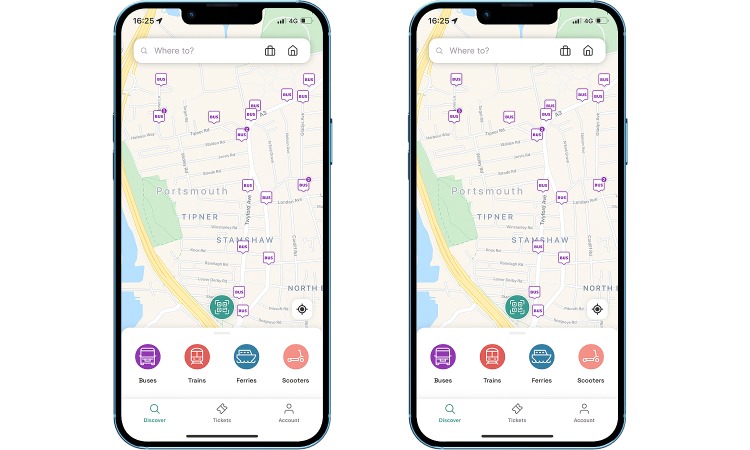Developing the UK’s first multi-city MaaS platform
- Like
- Digg
- Del
- Tumblr
- VKontakte
- Buffer
- Love This
- Odnoklassniki
- Meneame
- Blogger
- Amazon
- Yahoo Mail
- Gmail
- AOL
- Newsvine
- HackerNews
- Evernote
- MySpace
- Mail.ru
- Viadeo
- Line
- Comments
- Yummly
- SMS
- Viber
- Telegram
- Subscribe
- Skype
- Facebook Messenger
- Kakao
- LiveJournal
- Yammer
- Edgar
- Fintel
- Mix
- Instapaper
- Copy Link
Posted: 27 June 2022 | Chris Hillcoat - Solent Transport, Steve Longman - Solent Transport | No comments yet
Solent Transport’s Steve Longman and Chris Hillcoat discuss the work that has been undertaken to develop the UK’s first multi-city Mobility-as-a-Service platform in the Solent region – which includes Portsmouth, Southampton, South Hampshire and the Isle of Wight – and highlight the range of benefits that MaaS can bring to customers, transport operators and authorities.


A Mobility-as-a-Service (MaaS) platform is the flagship project of the Solent Future Transport Zone (FTZ) – an ambitious £29 million programme trialling new approaches to mobility and logistics, funded by the Department for Transport (DfT). The vision for Mobility-as-a-Service is to create a super-app that allows customers across the Solent region to book every type of ticket, on every transport mode, for every type of trip, without the need to jump between websites or mobile apps.
MaaS aims to provide users with the power to make informed decisions about how they travel for each individual journey”
Essentially, MaaS aims to provide users with the power to make informed decisions about how they travel for each individual journey. In addition to bringing all transport services in to one convenient location, users will be able to plan trips around real-time data, easily see the difference in cost and review the environmental impact of their decisions.
In principle, that sounds relatively simple, but what we’ve discovered during the last 18 months of development and testing is the complexity of bringing it all together. As well as the technical integrations, we have been working to build relationships with a wide range of partners and stakeholders.
Identifying a development partner
During the procurement process to secure our development partner, there were a vast range of organisations interested – many of which have experience running similar products in other countries. However, very few had experience of working in the UK – with its unique mixture of privately run public transport services and the very complex ticketing environment.
Following a competitive process, Trafi was appointed as our provider. The company is working in partnership with two subcontractors: Unicard – which has been working across the UK for many years on smart ticketing solutions – and the Behavioural Insights Team – which has become famous during the last decade for its work in behavioural science and ‘nudge’ theory. Trafi has experience of developing and running MaaS platforms in Berlin, Munich, Switzerland and in its native Lithuania. We are excited to be working with them on their first UK contract.
Regional complexity results in a unique approach
The Solent region is one of the most complex areas for public transport in the whole country, consisting of five different bus companies, seven ferry companies, several micro-mobility providers, taxi companies, car clubs and more. Unlike other areas in the country, there is no dominant public transport provider or Passenger Transport Executive, so it has been essential that we work in partnership with all of the operators in our region to secure their support for MaaS, and to work with them on the integration of their services.
Due to the amount of work that these integrations take, we focused on integrating three to four mobility service providers in order to launch our initial version as soon as possible. Then, on a two-week cycle, we would add additional services in future iterations of the app to streamline the process. Adding integrations using this approach has been invaluable as, although we wanted to launch with all services integrated, it would have taken much longer, and we would not have been able to apply the feedback that we received.
We also hope that bringing together all of the transport options in one place will give customers more choice, better information and lead to a greater number of people using public transport and active travel”
Changing the way that customers are defined, our approach to customers has been to remove the differentiation of ‘bus customers’, ‘train customers’ etc. and instead to put the users of our super-app at the heart of what we do. This approach has required changing the way that we and our stakeholders define customers by transport mode, so that they become MaaS users who want the flexibility and convenience of choosing the route and transport mode that suits them for the journey that they are making at that moment.
Thinking about users in this way encourages a holistic approach and opens up opportunities for our stakeholders to reach a wider audience. We also hope that bringing together all of the transport options in one place will give customers more choice, better information and lead to a greater number of people using public transport and active travel.
Bringing together a wide range of elements in one place
Any MaaS platform has many elements to consider when creating a product that offers customers a service that exceeds what they currently experience and tackles the common and recurrent pain points. These include: a journey planner that is responsive to changes in service demand or traffic conditions; app services supported on both Android and iOS; streamlined back-office services to process payments; producing tickets via QR code or ITSO cards; cloud services for hosting the app; payment service providers; banking providers; ID verification of driving licences; and not to mention the seamless integration of 10 to 15 transport operators with their own system requirements.
For the first time, our MaaS product will show customers all of their options in one place – including blended modes – and allow customers to buy their tickets at the same time”
Developing each of these elements independently is a complex task (for example, qualifying to become a retailer of rail tickets), but the real challenge of delivering MaaS is to develop all of these elements in parallel and launch a successful platform which uses complex tech integrations behind the scenes to create an extremely simple, intuitive and beautiful customer experience.
For the first time, our MaaS product will show customers all of their options in one place – including blended modes – and allow customers to buy their tickets at the same time. All of our behavioural science research shows that customers place great importance on interface and simplicity, so this great improvement in customer experience should increase the number of people using public transport.

Raising awareness of MaaS and its benefits
Another great challenge in delivering MaaS is raising awareness to customers about what MaaS is and its benefits for them. To promote the service and its benefits, we’ve worked with a marketing agency to create a new brand for our MaaS platform. We sought to create a brand that would emulate the success of Transport for London’s (TfL) Oyster card in its ubiquitous association with travel around the capital, but without tying the brand to public transport alone. We’re very pleased with the result and, when the MaaS app launches to the public in the coming months, not only will it be our first opportunity to share the brand, but it will be supported by a marketing campaign built around behaviour change principles.
What does the future hold?
We think that there is potential for MaaS to grow beyond the Solent region, and we have already spoken with several other local authorities who are very excited about the prospect of our platform being extended to their area. We’ve already done the hard work of contracting a MaaS provider, working out the technical integrations needed and developing an exciting new brand. Adding new areas and new transport operators to this mixture is a much simpler process, and it’s one that we hope will be very popular and will give real benefits to customers, transport operators and authorities.
Achieving commercial sustainability
Low margins across the transport industry mean that developing a plan to support the long‑term financial sustainability of our MaaS product is a key focus”
One of the most challenging elements of MaaS is how to make it commercially sustainable. We’ve already begun looking at how we could pay for the app once the FTZ programme ends in 2024. Current options include commissions on selling tickets, advertising and sponsorship, continued public sector funding and sales from ancillary services. Low margins across the transport industry mean that developing a plan to support the long‑term financial sustainability of our MaaS product is a key focus. Partnership with transport operators and other stakeholders is an obvious strategy to overcome this challenge, and we’re already working on a compelling proposition which will add value for transport operators but, more importantly, add value for their customers.
Post-launch developments
After we launch the MaaS platform in early 2022, we will be making continuous improvements throughout the funding period of the Future Transport Zone programme until the middle of 2024. These improvements will include incorporating the final transport integrations, including rail ticketing, ferries and hovercraft, micro-mobility and our bikeshare scheme – which is on course to launch in summer 2022.
Furthermore, we will also be facilitating world class university research led by the universities of Portsmouth and Southampton. The universities have already been working in close partnership with Trafi and the Behavioural Insights Team, as well as Solent Transport, to develop and deliver some exciting research – for example: making sure that the app interface is intuitive and logical for all customer groups and trialling different models of journey planning algorithms to test the best approach to showing trip options. As our project is UK government-funded, we also report back to DfT on a regular basis and speak with our counterparts in other local authorities and FTZ regions.




Related topics
Mobility Services, Passenger Experience, Public Transport, Sustainable Urban Transport
Issue
Issue 1 2022
Related cities
Isle of Wight, Portsmouth, South Hampshire, Southampton
Related countries
United Kingdom
Related organisations
Solent Transport
Related people
Chris Hillcoat, Steve Longman








